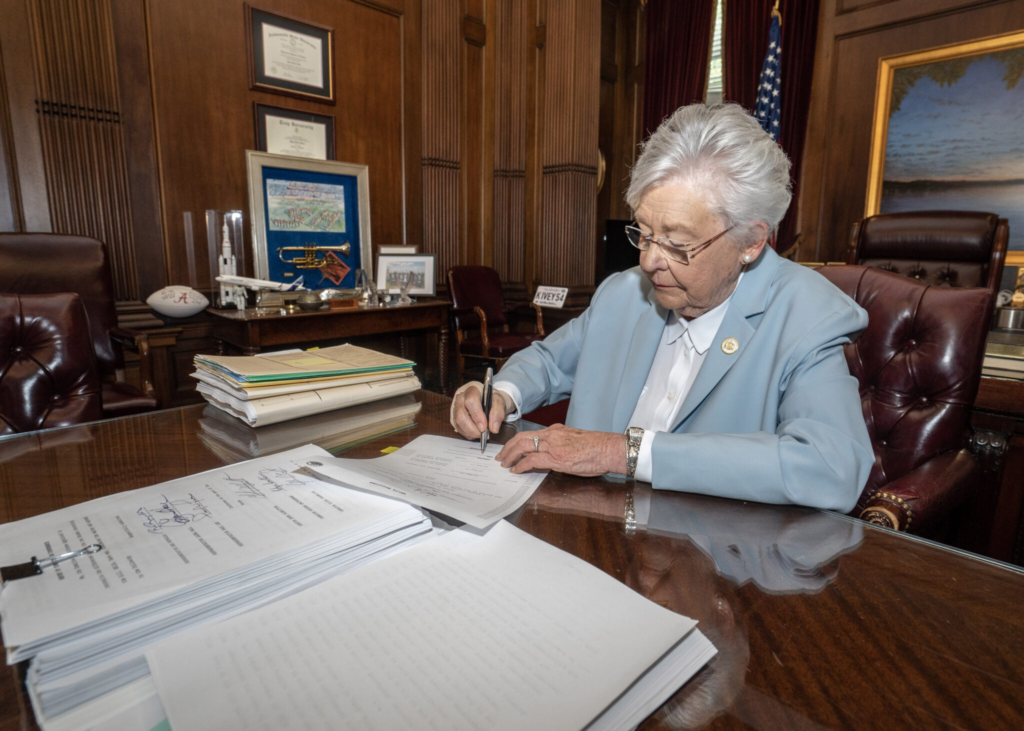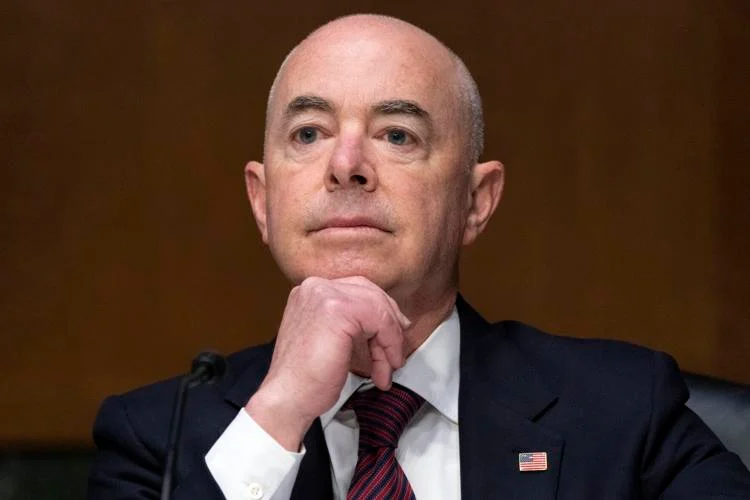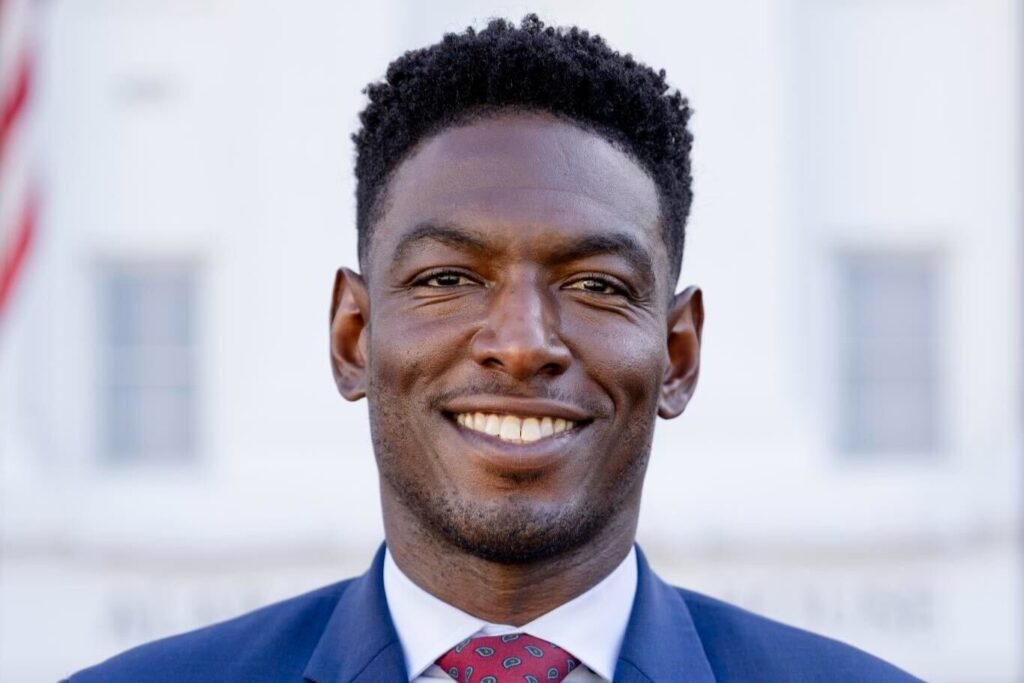State Rep. John Rogers remains in jail

State Representative John Rogers (D-Birmingham) was in court in Birmingham on Thursday for a hearing on his alleged violations of his bond. Judge Staci Cornelius sent him back to jail in Cullman, one of the few county jails that houses federal prisoners. Rogers has been accused of violating the terms of his bond by contacting witnesses in his corruption trial. Rogers has been indicted by the U.S. Department of Justice with obstruction of justice, accusing the 82-year-old state legislator of attempting to bribe witnesses with state grant dollars if they would lie to federal investigators in the ongoing federal corruption probe and has been charged with obstruction of justice. As part of the agreement of the terms of his bond, Rogers is not supposed to be contacting the witnesses in the case. Federal prosecutors accuse Rogers of violating the terms of his bond by twice attempting to contact witnesses on Facetime. Rogers also identified the previously anonymous witness, James Stewart, in a radio interview, further angering Judge Cornelius. Judge Cornelius has ordered Rogers to remain in jail and has set another hearing for Monday. Rogers maintains his innocence. Rogers’ longtime legislative assistant, Varrie Johnson Kindall, has been charged with 21 counts in the ongoing corruption probe. Rogers alleged obstruction charges are related to that ongoing investigation. Rogers reportedly lives with Kindall in Chelsea in Shelby County. According to his September indictment, between 2018 and 2022, Rogers was authorized to spend $500,000 from the Jefferson County Community Service Fund. Rogers was supposed to use that for Jefferson County programs. Rogers, however, appropriated $400,000 of the $500,000 under his control to the Piper Davis Youth Baseball League. The League was run by Fred Plump – age 76. Plump, who was elected to the Alabama House of Representatives last year, instead has admitted in his guilty pleading that he then paid $200,000 of that money in illegal kickbacks to Kindall. Kindall reportedly was romantically involved with both Rogers and Plump. In May Plump pleaded guilty, resigned from his office, and has agreed to cooperate with federal prosecutors. Travis Hendrix (D) has been elected to represent Plump’s House District 55 seat. Rogers still represents House District 52 – both districts are in Jefferson County. Rogers was first elected to the Alabama House of Representatives in 1982. To connect with the author of this story or to comment, email brandonmreporter@gmail.com.
Gov. Kay Ivey awards $1 million to state groups to support innovation projects

Gov. Kay Ivey has awarded nearly $1 million to assist Alabama research institutions and industries in producing innovative products and procedures that can help improve the lives of Alabamians. The grants from the Alabama Research and Development Enhancement Fund provide funds for research at Alabama universities and other institutions. The state-funded program helps create advances involving health and medicine, products and services, agriculture, and other fields of science and technology. “Alabama is fortunate to have world-caliber research institutions and top-notch scientists who are developing methods and products that will have lasting impacts on lives everywhere,” Gov. Ivey said. “I award these grants with praise for the wide-ranging contributions these institutions are making to advance our quality of life.” Gov. Ivey was recently in Huntsville at HudsonAlpha Institute for Biotechnology, one of the grant recipients, for the ribbon cutting of the Discovery Life Sciences headquarters on the HudsonAlpha campus. The research and development fund was created by the Alabama Legislature in 2019 and signed into law by Gov. Ivey as part of the Alabama Innovation Act. The Alabama Department of Economic and Community Affairs (ADECA) Energy Division is administering the research grant program. “ADECA is pleased to join with Gov. Ivey in commending these grant recipients and congratulating them on their past and future accomplishments,” ADECA Director Kenneth Boswell said. Those awarded grants are: ADECA administers a wide range of programs that support law enforcement, victim programs, economic development, water resource management, energy conservation, and recreation.
Caroleene Dobson qualifies for Congress in Congressional District 2

On Thursday, Montgomery attorney Caroleene Dobson officially qualified with the Republican Party to run for Alabama’s Second Congressional District. Currently, Dobson is the only qualified candidate for the GOP nomination for the newly redrawn CD2. Dobson grew up on a farm in Beatrice. She has a degree from Harvard and a law degree from Baylor University Law School. She practices real estate law. “As a member of Congress, I will fight for our families, our farms, and our faith and preserve the bedrock values and moral backbone that have made our nation the greatest ever known,” Dobson said. “It is time to give Washington, D.C. a good dose of Alabama common sense and go to battle against those on the far left who want to control how we use our property and what we do, think, and say.” Dobson is a member of the Alabama Forestry Commission, the Southeast Livestock Exposition, and the Birmingham Chapter of the Federalist Society. Dobson has promised to protect property rights and free speech rights if she is elected to Congress. Dobson grew up on a cattle farm and excelled in high school rodeo. She was a National Merit finalist and a U.S. Presidential Scholar. She currently practices with Maynard Nexsen in Birmingham. Dobson and her husband, Bobby, have two daughters. State Representative Jeremy Gray (D-Opelika) and Willie Lenard have both qualified to run as Democrats for the seat. Sen. Kirk Hatcher (D-Montgomery), Rep. Napoleon Bracy (D-Prichard), and Jefferson County Commissioner Sheila Tyson have announced that they are running but have not qualified to run yet. Congressman Barry Moore (R-Enterprise) currently represents District 2, but the court-appointed special master drew Moore and his home County (Coffee) out of the Second District and into the First. He is seeking a third term in his new home district against incumbent Congressman Jerry Carl (R-Mobile). The new District 2 spans the state from the Mississippi line to the Georgia line and includes Mobile, Montgomery, Greenville, Troy, Union Springs, Eufaula, and Phenix City, Qualifying for the Republican and Democratic candidates ends on November 10. The major party primaries are on March 5. To connect with the author of this story or to comment, email brandonmreporter@gmail.com.
Gary Palmer votes for aid for Israel, cuts funding to IRS

On Thursday, the Republican-controlled U.S. House of Representatives passed a bill to provide American support for Israel’s defense in its war with Hamas. The stand-alone funding bill also overturns much of President Joe Biden’s increase in new funding for the IRS. Congressman Gary Palmer (R-AL06) voted for the package and released a statement afterward. “When Biden Democrats show weakness in foreign policy stances, our friends around the world suffer,” said Rep. Palmer. “Israel has every right to defend itself from the brutal attacks we have been witnessing over the past month. With this piece of legislation, we are helping an ally in need while also cutting funding from Joe Biden’s weaponized IRS. These funds are better used supporting Israel than being used by IRS agents to audit middle-class Americans.” The Hill reported that Democrats criticized the $14.3 billion package because it cuts billions of dollars in aid for Gaza, which President Biden requested, and Biden’s measure to dramatically increase the enforcement arm of the Internal Revenue Service. The IRS funding cuts were part of the Inflation Reduction Plan passed when Democrats controlled the House during the last Congress and would hire 81,000 more IRS agents. It was also separate from the $61.3 billion Biden requested to assist Ukraine in its war with Russia. New Speaker of the House Mike Johnson (R-Louisiana) said that the House will address the Ukraine aid next in a separate bill. Twelve Democrats voted with almost all Republicans for the Israel aid bill, which passed 226 to 196. The passage of the bill is a win for Speaker Johnson. “It’s imperative that the U.S. sends a message to the world that threats made against Israel and the Jewish people will be met with strong opposition,” Johnson wrote on X. The GOP legislation is unlikely to pass the Democrat-controlled Senate in its current form. Since aid for Israel is a bipartisan priority, some version of an Israeli aid bill will pass the Senate – either as a stand-alone bill or in the form of the next continuing resolution (CR) as it is increasingly unlikely that either House of Congress will pass out a viable budget that the President will sign before the current CR expires. Some more bipartisan version of Israeli aid will likely come back to the House for a vote in the next three weeks. The White House has said President Biden will veto the bill if it comes to his desk in its current form. Palmer is serving in his fifth term representing Alabama’s Sixth Congressional District. He announced this week that he will seek a sixth term in next year’s election. To connect with the author of this story or to comment, email brandonmreporter@gmail.com.
Robin Litaker qualifies in Congressional District Seven

On Tuesday, retired schoolteacher Robin Litaker qualified as a Republican to run for Congress in Alabama’s Seventh Congressional District. Litaker is challenging incumbent Congresswoman Terri Sewell (D-AL07) in the general election. Alabama Today spoke with Litaker about her campaign. When asked why she was running for Congress, Litaker said, “There are tons of reasons. Our country is in desperate need for conservative leadership.” “We have been traveling across the Black Belt as well as Birmingham even before the redistricting lines were redrawn, and there are so many needs,” Litaker said. “There are areas with no running water. There are areas with no sewage service.” “The Blackbelt has the richest soil in the world, but it is one of the most impoverished regions, not just in the state, but in our country.” The incumbent. Rep. Sewell is in her seventh term representing the Seventh Congressional District, but Litaker believes she can do a better job than Sewell. “The further away you get from an area, the less responsive to that community you become,” Litaker said. “Take Selma for example it is disintegrating with all of the population loss.” “We see a lot of her during election time, but in my travels, I have met with people all over the district who have never seen her,” Litaker added. Republicans like to say that the budget needs to be balanced but usually provide no specifics. When asked what she would cut from the federal budget, Litaker said, “Well, we have got a lot of problems.” Litaker said that a lot of the issue is the bureaucratic agencies have become “bloated.” Litaker gave the Department of Education as an example. “I do believe in school choice, but a poor in Choctaw County has to have a public education,” Litaker stated. “The federal Department of Education is so bloated with administrative costs that none of the money is getting down to the child. As a teacher, you are dictated to from the Department of Education. Even when you get federal money, they dictate what you can do with it. Whatever we are doing, obviously, it ain’t worked.” Litaker said that she favored abolishing the federal Department of Education. “Every agency can be trimmed,” Litaker continued. “The spending, it is out of control, and the salaries that the upper people get are outrageous.” “Every citizen has to balance their checkbook,” Litaker added. “If you spend and borrow more money than you can pay back, there would be repercussions. When Congress spends more than we have, there should also be repercussions.” When asked if she supported aiding Ukraine in its current war with Russia, Litaker stated, “No, what I don’t endorse is spending billions in unaccountable dollars. We have issues here. We are being invaded on our southern border, and I haven’t heard anything from the current district seven representative about it.” There is a lot of rural land mass in CD7. Alabama Today asked Litaker if she was confident that she could effectively represent Alabama farmers in the Congress. “Oh yes. I have talked to some farmers in my travels, and they want a voice,” Litaker said. “They need an advocate. The Blackbelt is one of the richest land areas in the world, but underutilized.” Litaker said that she supports legislation preventing foreign nationals from buying American farmland, but she would go further than that and take back the land owned by foreign nationals if their government does something hostile towards the U.S. “We need to put more in place to protect the farmers,” Litaker said. “I have got some ideas I have been working on. They need our support.” At present, Litaker does not have a Republican primary opponent. No Democrat has formally qualified to run against Sewell. The election is still 13 months away. To connect with the author of this story or to comment, email brandonmreporter@gmail.com.
Alabama Supreme Court gives go ahead for execution by nitrogen hypoxia

Ralph Chapoco, Alabama Reflector Alabama is one step closer to becoming the first state to execute someone by nitrogen hypoxia. In a 6-2 decision handed down Wednesday, the Alabama Supreme Court allowed the state to proceed with the execution of Kenneth Eugene Smith, convicted of the 1988 murder of Elizabeth Sennett, under that method. Alabama Attorney General Steve Marshall said in a statement Wednesday that Sennett’s family had “waited an unconscionable 35 years to see justice served.” “Though the wait has been far too long, I am grateful that our talented capital litigators have nearly gotten this case to the finish line,” the statement said. Chief Justice Tom Parker and Associate Justice Greg Cook dissented but gave no additional comment. Nitrogen hypoxia has never been used on a human being as a means of execution, and professional veterinary associations have discouraged its use in the euthanization of animals. Smith’s attorneys said in a statement Thursday that they were disappointed in the decision and would continue to work through the judicial process. Smith currently has an appeal pending with the Alabama Court of Criminal Appeals claiming that attempting to execute him a second time violates his constitutional rights. “It is noteworthy that two justices dissented from this Order,” wrote Robert Grass, an attorney for Smith. “Like the eleven jurors who did not believe Mr. Smith should be executed, we remain hopeful that those who review this case will see that a second attempt to execute Mr. Smith – this time with an experimental, never-before-used method and with a protocol that has never been fully disclosed to him or his counsel – is unwarranted and unjust.” The order gives the Alabama Department of Corrections the authority to carry out Smith’s execution within the time frame set by Gov. Kay Ivey, which cannot happen less than 30 days from Wednesday, when the court published its decision. The Attorney General’s Office filed a motion with the Alabama Supreme Court back in August, requesting the court set a date for Smith’s execution. Smith’s attorneys requested the court reject the state’s motion in September, stating that nitrogen hypoxia has not been tested and only recently released the protocol for using that method of execution. A jury convicted Smith in 1996 in the plot to murder Sennett and voted to sentence him to life without the possibility of parole. The judge in the case overrode the jury recommendation and sentenced Smith to death. Alabama abolished judicial override in 2017, the last state in the country to do so. But the rule was not made retroactive. In May the U.S. Supreme Court upheld a lower court’s decision that allowed him to select his method of execution, in this case is death by nitrogen hypoxia. The high court turned down the appeal by the Alabama Department of Corrections, which argued that Smith was pursuing a delaying tactic. Smith was scheduled to be executed in November following the botched executions of Joe Nathan James Jr. and Alan Miller. However, his execution was called off after ADOC staff repeatedly failed to secure a vein to carry out the execution. Smith’s attorneys wrote in a brief last January that he “continues to experience physical and emotional pain, including lingering pain in his arm, near his collarbone, back spasms, difficulty sleeping, and likely post-traumatic stress disorder” from the failed execution. Death through nitrogen hypoxia became an available method for executing people on death row after the Legislature passed a bill sponsored by Sen. Trip Pittman, R-Montrose, allowing its use. He said that the method was more humane than lethal injection. Doctors and medical ethicists have criticized those claims. “Last year, after Alabama tortured multiple people in botched executions using lethal injection, we encouraged the state to pursue an independent evaluation of its execution protocols,” said Alison Mollman, interim legal director of the ACLU of Alabama. “Governor Ivey and the Alabama Department of Corrections failed to complete an independent review and instead insisted the problem was not having enough time to kill someone. Now, at the urging of Attorney General Steve Marshall, Alabama is rushing to put a man to death with an untested, unproven, and never-before-used method of execution. As Alabama races to experiment on incarcerated people with nitrogen gas, they put the lives of correctional staff, spiritual advisers, the media, and victims at risk by potentially exposing them to an odorless and lethal gas. Using this method has no benefit on public safety. Governor Ivey and Attorney General Marshall have a responsibility to stop the execution of Mr. Smith.” The Death Penalty Information Center, a nonprofit that students and collects data on the death penalty, criticized Alabama’s move toward nitrogen executions in a statement on Thursday. “No state has ever used nitrogen in an execution, and there are still too many unanswered questions for Alabama officials to responsibly move forward with this protocol,” the statement said. “Mr. Smith has already endured one botched execution; he should not now face another attempt that carries this much risk and uncertainty.” Alabama Reflector is part of States Newsroom, a network of news bureaus supported by grants and a coalition of donors as a 501c(3) public charity. Alabama Reflector maintains editorial independence. Follow Alabama Reflector on Facebook and Twitter.
Former border chief: Alejandro Mayorkas underreported gotaway data in Senate hearing

By Bethany Blankley | The Center Square contributor Former U.S. Customs and Border Protection Chief Mark Morgan estimates the number of people who entered the U.S. illegally and evaded capture in fiscal 2023 is closer to one million, much higher than the “over 600,000” that Department of Homeland Security Secretary Alejandro Mayorkas told U.S. senators at a Tuesday hearing. Morgan told The Center Square Wednesday in response to questions about Mayorkas’ testimony that official known gotaway data could hit one million in fiscal 2023, and the nearly 1.7 million gotaways since January 2021 is underreported by at least 20%. It’s “closer to over 2 million,” he said of the gotaway numbers since President Joe Biden first took office. Gotaways is the official term used by Customs and Border Protection to describe foreign nationals who illegally enter the U.S. primarily between ports of entry and don’t return to Mexico or Canada. They generally don’t file asylum or other immigration-related claims and intentionally illegally enter to avoid being caught. Many have criminal records, and run when pursued by Border Patrol agents or others in law enforcement, officials have told The Center Square. “The question Secretary Mayorkas should be providing the American people an answer to is how many aliens on the Terror Watchlist or Special Interest Aliens, who come from countries we know sponsor or harbor terrorist organizations, are among the [close to 1.7 million] known gotaways who have entered our country under his watch,” he told The Center Square. “The answer is – he has no idea. It’s not if, and when, the threat arrives in our homeland. It’s already here.” Mayorkas testified Tuesday before the Senate Homeland Security Committee, saying there were over 600,000 gotaways reported in fiscal 2023, a low estimate compared to data first reported by The Center Square. U.S. Sen. Roger Marshall, R-Kansas, asked Mayorkas how many gotaways U.S. Customs and Border Protection reported in 2023. Mayorkas replied, “I believe that number is over 600,000. I am sure you are well aware the phenomenon of gotaways is something that has been a challenge for the Department of Homeland Security for decades. In fact, it is a powerful example of a broken immigration system.” According to preliminary data obtained by The Center Square, Border Patrol agents reported at least 769,174 gotaways in nine southwest border sectors in fiscal 2023. This excludes Office of Field Operations data and data from the remaining 11 CBP sectors nationwide (there are 20), including at the northern border. Border Patrol agents in one northern border sector alone reported roughly 4,000 gotaways in fiscal 2023, the highest in northern border history. The nearly 770,000 gotaways are included in the roughly 4 million illegal border crossers reported in fiscal 2023 and more than 10 million since January 2021, when President Joe Biden first took office. These are the highest numbers of illegal border crossers reported in recorded U.S. history. By contrast, there were at least 308,655 known, reported gotaways in fiscal 2021 and 606,150 reported in fiscal 2022, as first reported by The Center Square. In fiscal 2023, 736 known or suspected terrorists (KSTs) were apprehended at the northern and southern borders, according to CBP data. The number of KSTs who were among the gotaway numbers is unknown. The majority of gotaways are single, military-age men. However, they also include women and children, many who are smuggled, law enforcement officers say. Former ICE Chief Tom Homan not only disagrees with Mayorkas’ claim about gotaways representing a “broken immigration system” but says the issue isn’t about immigration but about national security. “If you don’t think a single one of the 1.7 million [gotaways] is coming from a country that sponsors terrorism, then you’re ignoring the data,” he said. “That’s what makes this a huge national security issue.” Homan maintains that Mayorkas destroyed the system he and others put in place during the Trump administration and Biden administration border policies “are the greatest national security threat since 9/11.” As a result, he says, Mayorkas should be impeached. “Based on recently released data on the border numbers,” including “over 900,000 illegal aliens released in the U.S.” and the more than 600,000 gotaways Mayorkas claims were reported in one year, he said, “DHS Secretary Mayorkas needs to be impeached.” Homan also says he’s been calling on Congress to impeach Mayorkas for over two years. Several Congressional Republicans and state attorneys general, led by Florida AG Ashley Moody, have called for him to be impeached. Republicans on the U.S. House Committee on Homeland Security, led by committee chairman Mark Green, R-Tennessee, are continuing to hold hearings and issue reports to support their claim that Mayorkas is derelict in his duty and must be removed from office. Green, a retired U.S. Army Major and West Point graduate, says Mayorkas is derelict not only for helping to create the border crisis but also for DHS not properly vetting Afghan “refugees” brought to the U.S. after Biden’s deadly and chaotic withdrawal of U.S. troops from Afghanistan in August 2021. The Center Square has been reporting preliminary Border Patrol data, excluding OFO data, obtained from a Border Patrol agent on condition of anonymity for fear of reprisal. Official data is still a best guess, officials say, because agents aren’t able to report everyone who gets away for several reasons. Former Border Patrol Chief Raul Ortiz previously testified to Congress that gotaway data is underreported by between 10% and 20%. Ultimately, law enforcement officials say they have no idea how many gotaways are in the U.S., where, or who they are. The Border Report: #Gotaways caught on camera primarily in Terrell County in Big Bend Sector of Texas. Border Patrol agents, law enforcement, Homeland Security—tasked w defending the homeland—have no idea who or where they are. Nearly 1.6 million, => ind populations of 11 states. pic.twitter.com/PHnXFWrOFR— Bethany Blankley (@BethanyBlankley) August 24, 2023 To learn more, follow The Border Report with Bethany Blankley on Facebook and X. Republished with the permission of The Center Square.
Rep. Jeremy Gray enters Alabama’s 2nd Congressional District race

Jemma Stephenson, Alabama Reflector Rep. Jeremy Gray, D-Opelika, jumped into the 2nd Congressional District race on Thursday, becoming the third Democratic member of the Legislature to enter the contest. Gray, first elected to the Alabama House of Representatives in 2018, cited issues including reliable housing, childcare, and women’s rights in an announcement on Facebook. “It’s time for a new generation of leadership to bend the arc of justice,” the statement said. “Because the American Dream should be a promise, not a privilege.” In a video accompanying donation requests, Gray also cited his legislation that allowed yoga exercises to be performed in Alabama schools, ending a nearly three-decade-long ban. Gray, a business owner and personal trainer, played college football for North Carolina State University and later played in the Canadian Football League and Arena Football League. A federal court last month approved new congressional maps for the state. The map created a new 2nd Congressional District with a Black Voting Age Population of 48.7%. Due to the racial polarization of Alabama’s voting patterns – where white Alabamians tend to vote Republican and Black Alabamians tend to vote Democratic – the district is seen as a potential pick-up for Democrats. Sen. Kirk Hatcher, D-Montgomery, and Rep. Napoleon Bracy, D-Prichard, have also said they will run for the seat. Democrats Terrell Anderson, Phyllis Harvey-Hall, and Austin Vigue are also running for the seat. Attorney Caroleene Dobson is running on the Republican side. House Minority Leader Anthony Daniels, D-Huntsville, and Sen. Merika Coleman, D-Birmingham, have also said they may enter the race. Former Sen. Dick Brewbaker of Pike Road, a Republican, is also considering a run. The 2nd Congressional District includes Montgomery and the southern Black Belt. Alabama Reflector is part of States Newsroom, a network of news bureaus supported by grants and a coalition of donors as a 501c(3) public charity. Follow Alabama Reflector on Facebook and Twitter.

